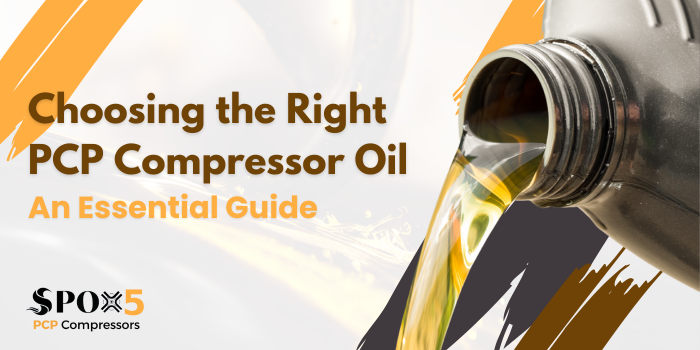Your SPOX5 PCP compressor is a workhorse, reliably delivering compressed air for various applications. But like any hardworking machine, it requires proper care to function at its best. One crucial aspect of this care is using the right oil. The wrong oil can lead to decreased performance, increased wear and tear, and even costly breakdowns.
This guide delves into the key factors to consider when choosing the right PCP compressor oil, ensuring your equipment operates smoothly and efficiently for years to come.
Understanding the Role of Oil in PCP Compressors
Oil plays a vital role in the proper operation of your PCP compressor. Here are its primary functions:
- Lubrication: The oil forms a protective film between moving parts, minimizing friction and wear on internal components like pistons, bearings, and valves. This reduces heat generation and extends the lifespan of your compressor.
- Cooling: As the compressor operates, internal components generate heat. Oil acts as a coolant, absorbing heat and transferring it to the compressor’s exterior for dissipation. This helps maintain optimal operating temperatures and prevents overheating.
- Sealing: Oil helps to create a seal between the piston rings and cylinder walls. This prevents compressed air from leaking back into the crankcase and ensures efficient operation.
- Corrosion Protection: Oil forms a barrier on metal surfaces, protecting them from corrosion caused by moisture and contaminants.
Synthetic vs. Mineral Oil: Making the Right Choice
When selecting PCP compressor oil, you’ll encounter two primary options: synthetic and mineral oil. Each has its own advantages and disadvantages:
- Synthetic Oil:
- Advantages: Synthetic oil offers superior performance at both high and low temperatures. It maintains its viscosity more consistently, leading to better lubrication and reduced wear under extreme conditions. Synthetic oil also boasts superior anti-foaming properties and resists oxidation better, extending its lifespan and offering a longer drain interval.
- Disadvantages: Synthetic oil typically comes with a higher price tag compared to mineral oil.
- Mineral Oil:
- Advantages: Mineral oil is generally less expensive than synthetic oil.
- Disadvantages: Mineral oil can break down more readily at high temperatures, losing its lubricating properties and potentially leading to increased wear and tear. It also has a shorter lifespan and requires more frequent oil changes.
In most cases, synthetic oil is the recommended choice for PCP compressors. Its superior performance characteristics translate to better protection, longer oil life, and ultimately, a longer lifespan for your compressor. However, if budget is a major concern and your compressor operates under moderate temperatures, mineral oil can be a viable option.
Choosing the Right Viscosity Grade
Oil viscosity refers to its resistance to flow. For PCP compressors, the viscosity grade is crucial. Oil that is too thin won’t provide adequate lubrication, while oil that is too thick can increase friction and hinder performance.
Always adhere to the manufacturer’s recommendations for oil viscosity. Consult the user manual for your specific PCP compressor model to find the recommended viscosity grade. The most common viscosity grades used in PCP compressors are ISO 32, ISO 46, and ISO 68.
Here’s a general guideline for viscosity selection based on operating temperature:
- Colder Temperatures (Below 40°F): ISO 32 oil provides better cold-start performance and improved lubrication during winter operations.
- Moderate Temperatures (40°F – 100°F): ISO 46 oil is a versatile choice for most operating conditions.
- Hotter Temperatures (Above 100°F): ISO 68 oil offers better viscosity retention at higher temperatures, ensuring adequate lubrication under demanding conditions.
Remember, these are just general guidelines. Always prioritize the manufacturer’s recommendations.
Additional Factors to Consider
Here are some other factors to consider when choosing PCP compressor oil:
- Compatibility with Your Compressor: Ensure the oil you choose is specifically formulated for PCP compressors. Regular engine oil might not contain the necessary additives for proper operation and protection of your compressor’s internal components.
- Brand Reputation: Opt for a reputable brand known for manufacturing high-quality compressor oils.
- Anti-Wear Additives: Look for oils that contain anti-wear additives, providing additional protection against wear and tear on internal components.
Conclusion: Invest in the Right Oil for a Healthy Compressor
Choosing the right PCP compressor oil is a crucial step in ensuring the longevity and optimal performance of your valuable equipment. By understanding the role of oil, the differences between synthetic and mineral oil, and the importance of viscosity, you can make an informed decision.
Always prioritize the manufacturer’s recommendations and invest in a high-quality, properly formulated

